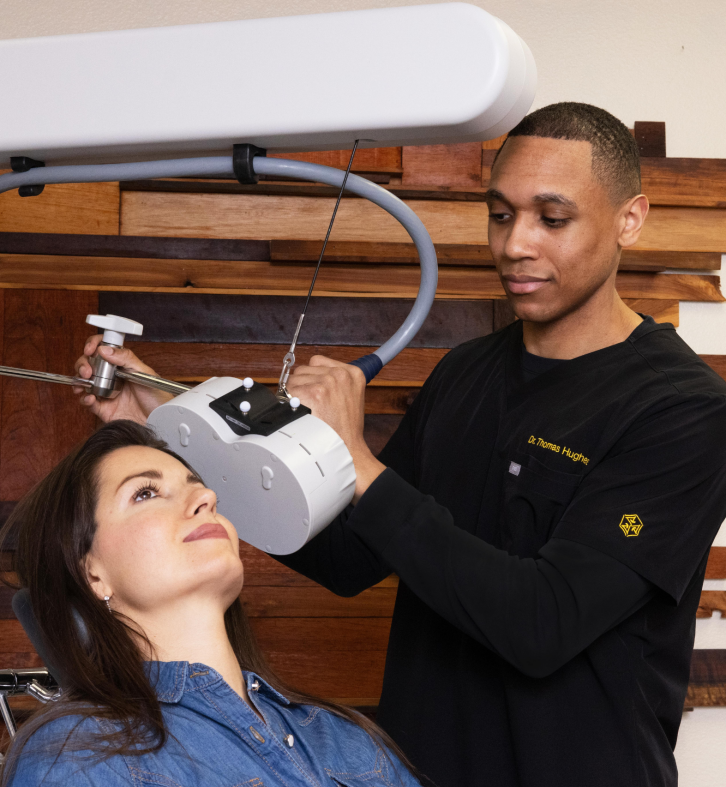PTSD Treatment
in Glendale, Burbank, and Surrounding Areas

Personalized, Science-Driven Trauma Care at NeoPsych
What Is PTSD?
Post-Traumatic Stress Disorder is a collection of symptoms that result after a traumatic event. An official diagnosis requires symptoms from four categories that are listed below. Each category has a list of symptoms associated with it:
- Trauma Event – an event where death, threat of death, or sexual violence occurred
- Intrusion in the form of nightmares or flashbacks to the event during the day
- Avoidance of thoughts and behaviors
- Negative changes in thoughts and mood
- Changes in arousal and reactivity (hyperarousal)
At NeoPsych, we offer a range of cutting-edge treatment options to help patients in Glendale, Burbank, and nearby communities find relief and long-term recovery.

PTSD Treatment Options at NeoPsych
Our approach to PTSD treatment goes beyond standard therapy and includes advanced modalities such as:
- Transcranial Magnetic Stimulation (TMS)
- Stellate Ganglion Block (SGB)
- Eye Movement Desensitization and Reprocessing (EMDR)
- Targeted psychiatric medication management
How Can TMS Help with PTSD?
Transcranial Magnetic Stimulation is a procedure that stimulates a specific area of the brain in order to treat conditions like depression or anxiety. The stimulation is either inhibitory or excitatory depending on what condition is being treated, such as inhibition for anxiety symptoms or excitation for depressive symptoms. In a condition like PTSD, where symptoms of anxiety (hyperarousal, flashbacks) and depression (negative changes in mood) are present, TMS can be a great option. Read here for more details about the benefits of TMS.
While TMS is known to be beneficial for anxious-depression, the procedure’s most robust effect is on depressive symptoms. For severe anxiety relief associated with PTSD, Neopsych also recommends looking into Stellate Ganglion Blockade (SGB). For hypervigilance and overcoming avoidance and behavioral changes after a traumatic event, NeoPsych recommends looking into EMDR. Continue reading for more information
How Can Stellate Ganglion Blockade (SGB) Help?
Stellate Ganglion Blockade is a procedure where an MD uses a numbing agent on a bundle of nerves known as the Stellate Ganglion. This bundle is highly associated with the sympathetic nervous system, which is often responsible for feelings of anxiety and panic. As such, the numbing agent often provides long lasting relief for the person afflicted with symptoms of PTSD and anxiety.
The doctor will use an ultrasound to locate the stellate ganglion and apply the numbing agent. The procedure takes about 20 minutes to perform, with no requirements for general anesthesia. Most patients do very well with a standard oral anti-anxiety medication shortly before the procedure ( Xanax or Ativan are the most popular choices). Patients that want to use general anesthesia are welcome to request it. Our providers are happy to coordinate the use of a surgical suite.
Click here for more specific information about Stellate Ganglion Blockade at NeoPsych.
How Can EMDR Help?
Eye Movement Desensitization and Reprocessing is a type of talk therapy where a patient is guided through recalling traumatic memories for the purpose of developing a tolerance to the distress that the memories cause. While EMDR does not completely remove the negative emotions associated with the incident, it can help people develop the skills and strength needed to move on with daily activities. Avoidance, changes in arousal and reactivity, and negative changes in thought, are all symptoms of PTSD that EMDR can help with. A standard course of EMDR can be 1 session per week for 10-20 weeks. It is a modality that can be administered via tele or in-person.
Combining this cognitive and behavioral therapy modality with TMS and SGB can be a powerful way to address the symptoms of being traumatized
How Can Medications Help?
For decades, medications have been used in the treatment of PTSD. While there are more expected side effects with this line of treatment, it is still a valuable tool for severe cases of PTSD. There are medications available that dampen the hyperarousal of PTSD, help with sleep, and help with nightmares associated with PTSD. All medications are prescribed and monitored by our board-certified psychiatric providers, ensuring safe and effective integration into your overall treatment plan.
Common options include:
- Lexapro – An SSRI that reduces anxiety and improves mood
- Clonidine – Often used to reduce hyperarousal and promote sleep
- Prazosin – Highly effective in reducing trauma-related nightmares
Why Choose NeoPsych?
NeoPsych is a leader in trauma-informed psychiatry and functional mental health care. We’re proud to serve patients throughout Glendale, Burbank, Pasadena, La Cañada, and the greater Los Angeles area with a holistic approach grounded in neuroscience and personalized medicine. NeoPsych proudly serves patients throughout Los Angeles County, with a centrally located office designed for privacy, professionalism, and clinical excellence. Whether you’re navigating recent trauma or struggling with long-standing PTSD, our team is here to help you reclaim your mental health.
